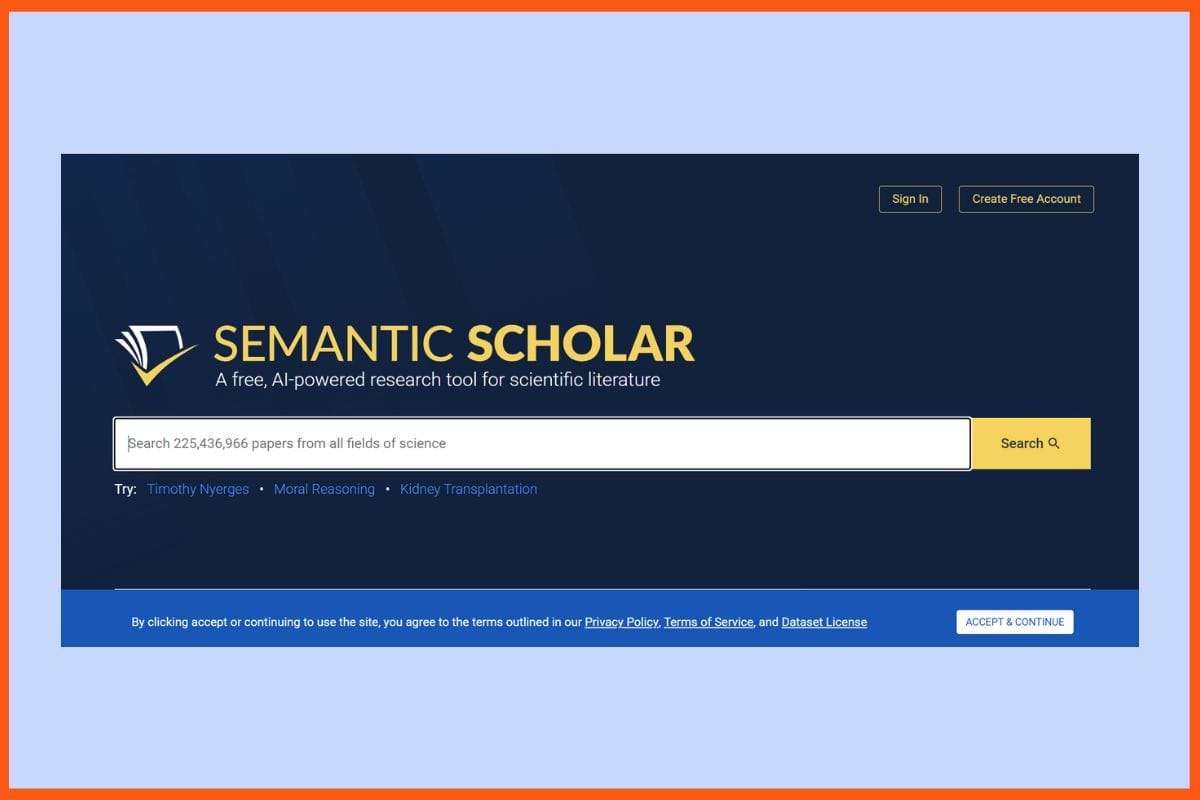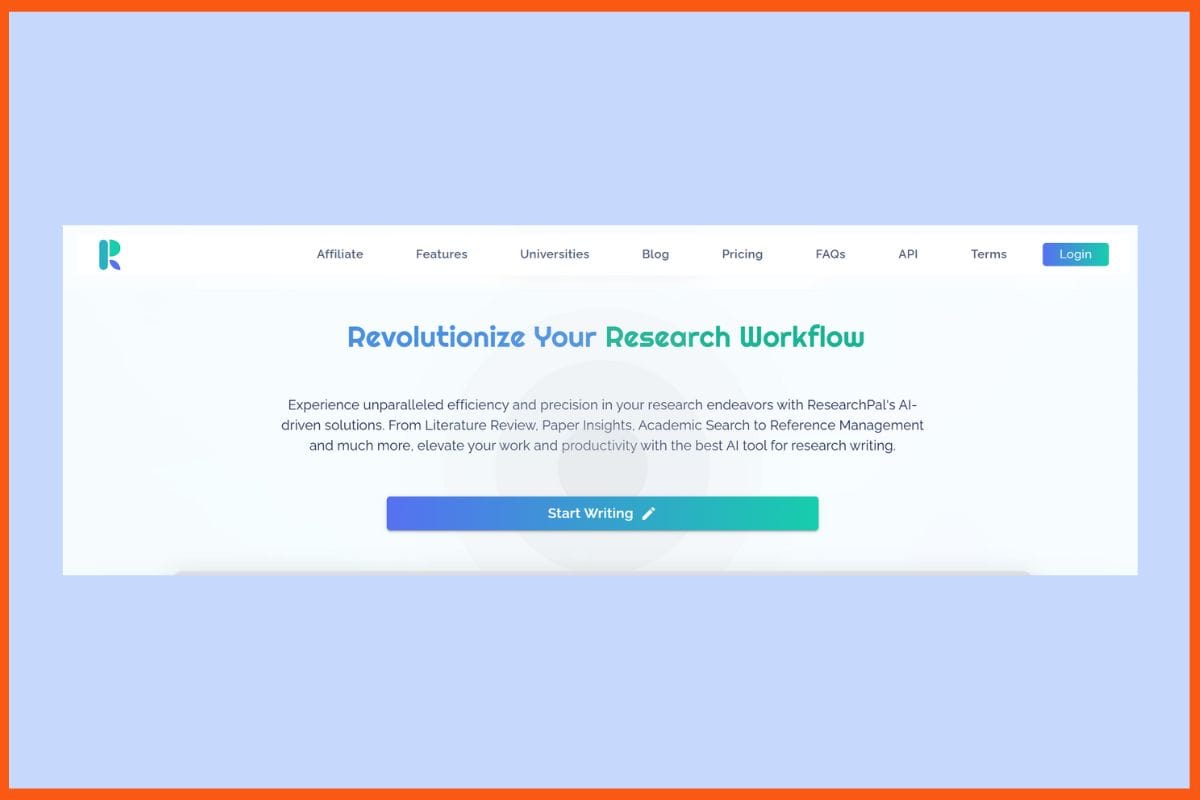Best AI Tools for Literature Review
🛠️Tools
Artificial intelligence (AI) shows how much technology has advanced in literature review by the use of NLP and machine learning to analyze massive academic data effectively. They would derive insights, summarize research findings, and novices through human error improvement in an effective manner. It automates the study identification based on keywords and research questions, hence eliminating much time involved in searching. It has summarization features that include concise and structured summaries with citations; thus, it may refer to key points conveniently. Besides, integrated citation management makes sure that proper formatting accords with academic standards.
Also among the advances that AI could give are topic modeling and sentiment analysis, which enable users to identify trends and patterns across multiple studies. Most of the tools will typically offer an option for the users to tweak their search terms or come up with a tailor-made summary table. New features automatically update the website with the latest publications to keep the reviews relevant.
Elicit
Semantic Scholar
Consensus
Research Rabbit
Scite
ResearchPal
Paperpal
MAXQDA
Iris AI
Mendeley
Elicit
| WEBSITE | ELICIT.COM |
|---|---|
| Rating | 4.3 |
| Free Trial | Yes |
| Best For | Speed up literature review |

Elicit is an AI-powered research assistant designed to accelerate literature reviews using large language models such as GPT-3. It automates workflows to allow researchers to find, summarize, and analyze academic papers. With key insights structured in a table, Elicit makes data extraction easy for systematic reviews and meta-analyses. The tool finds relevant studies, summarizes their abstracts, and evaluates citations to call out influential research. Users can personalize the data extraction by adding study-specific details as well as seamlessly integrating with reference managers like Zotero. Elicit is also well-connected with over 200 million papers via Semantic Scholar. Beyond that, it promotes interactivity in research exploration by formulating questions and brainstorming for new research directions.
Pros
- Intuitive interface
- Comprehensive search
- Integrates with citation management tool
Cons
- Steep learning curve for advanced features
- Limited full text access
Pricing
| Plan | Pricing |
|---|---|
| Plus | $12/month |
| Pro | $49/month |
| Team | $79/user |
| Enterprise | Elicit offers custom pricing; contact them for a quote. |
Semantic Scholar

| WEBSITE | www.semanticscholar.org |
|---|---|
| Rating | 4.3 |
| Free Trial | Yes |
| Best For | Researchers can understand a paper at a glance |
Semantic Scholar is a free AI-powered tool built by the Allen Institute for AI that helps users navigate through massive science literature. It uses machine learning and natural language processing to access over 180 million papers in all disciplines, like biology, medicine, social sciences, and engineering. It offers high-end search functionality, AI-generated paper TLDRs, and citation analysis, to mention only a few, which highlights influential studies. An author profile containing publication metrics has been provided. Plus, Semantic Reader can skim key content with personal paper recommendations made available based on search history. Topic Pages organize research into various fields, making it easier to explore specific areas of interest for academic research and literature reviews.
Pros
- Saves time by summarising papers
- Access to vast database
- Free access
Cons
- Results might contain some bias
- Scope for factual errors
Consensus
| WEBSITE | www.consensus.app |
|---|---|
| Rating | 4.2 |
| Free Trial | Yes |
| Best For | AI-powered research summaries for quick insights |

Consensus is an innovative AI academic search engine that promotes literature reviews and helps researchers, students, and academics effectively find and analyze the scientific literature. With over 200 million research papers, it brings OpenAI and custom language models into play for quickly creating summaries and insights. It visualizes scientific agreement on a topic studies supporting or refuting it. Pro Analysis gives everything by extracting speeches, synthesizing content, and providing formatting assistance. Advanced search filters refine results by study design, sample size, and methodology, while quality indicators highlight citation impact and journal credibility. Other features include Study Snapshot to extract critical details from your reading and bookmark tools to save papers and reading.
Pros
- User friendly interface
- Direct links to scientific papers
- High quality research through advanced filters
Cons
- Steep learning curve for advanced features
- Potential bias for search results
Pricing
| Plan | Pricing |
|---|---|
| Premium | $11.99/month |
| Teams | $12.99/seat/month |
| Enterprise | Consensus offers custom pricing; contact them for a quote. |
Research Rabbit
| WEBSITE | www.researchrabbit.ai |
|---|---|
| Rating | 4.5 |
| Free Trial | Yes |
| Best For | Visual literature mapping and discovering related research |

Research Rabbit is a free AI-driven tool that fosters the efficient discovery, organization, and analysis of literature by researchers. It establishes the relationship between papers through citation networks and bibliographic coupling to visualize connections between papers, authors, and research trends using interactive maps. Users may explore key authors, track collaborative efforts, and grasp the trends of research. Smart recommendations improve with the addition of more papers to collections for making literature review richer. Collaboration features allow sharing collections and adding notes, thus improving teamwork on research projects. Its interactive interface enables smooth navigation through bookmarks and categorization. With its integration with databases like PubMed and Semantic Scholar, Research Rabbit gives hundreds of millions of academic articles a cross-disciplined reach.
Pros
- Automates paper discovery and organisation
- Seamless collaboration with teams
- Visual maps enable to identify links between paper and authors
Cons
- Limited database updates
- Limited to journal articles

Scite
| WEBSITE | www.scite.ai |
|---|---|
| Rating | 4.4 |
| Free Trial | Yes |
| Best For | Smart citations and understanding paper credibility |

Scite is indeed an AI-oriented application that uses advanced citation analyses and research discovery tools to improve literature reviews. The Smart Citations feature categorizes the same citation under several heads, depending on whether it supports, contradicts or only mentions the specific paper, and thus provides context for the citations. The platform is integrated with publishers like Wiley and preprint servers like arXiv and bioRxiv, which allows for maximal availability to the academic public. The AI Assistant processes evidence-based summaries while the Citation Chaining tool captures trails of citations to identify related studies. Users are afforded citation influence analyses using advanced search filters, visualization tools, and a personalized research dashboard.
Pros
- User friendly interface
- Visual data representation
- Comprehensive coverage on different topics
Cons
- Steep learning curve for advanced features
- Some features are not accessible to all users
Pricing
| Plan | Pricing |
|---|---|
| Personal | $20/month |
| Organisation | Scite offers custom pricing; contact them for a quote. |
ResearchPal
| WEBSITE | www.researchpal.co |
|---|---|
| Rating | 4.9 |
| Free Trial | Yes |
| Best For | AI-powered assistance for literature reviews, reference management, and academic writing |

ResearchPal is an AI-oriented online tool designed to ease the process of literature review and academic research automation by summarizing papers, making references, and generating material content. It has fast ways to identify and summarize relevant papers, generate correct citations, and make academic writing not only clearer but also with the appropriate tone. Clearly, it has domain-specific search to provide personalized recommendations within their field of study. Thus, PDF Chat is available to explore documents interactively, writing transcription in more than 30 languages. It is a well-known integration with Zotero and Mendeley to manage a research library efficiently. This is research trusted worldwide; it helps to increase productivity by extracting key insights and reducing time in performing tedious research.
Pros
- Automates citation and summarisation
- Beginner friendly
- Collaboration friendly
Cons
- Limited database scope
- Subscription required for advanced features
Pricing
| Plan | Pricing |
|---|---|
| Standard | $9/month |
| Pro | $39.99/month |
Paperpal
| WEBSITE | www.paperpal.com |
|---|---|
| Rating | 4.4 |
| Free Trial | Yes |
| Best For | AI-powered academic writing assistance, including grammar checks, paraphrasing, and plagiarism detection |

Paperpal is an AI-powered academic writing tool developed by Cactus Communications for the world of researchers. This tool supports the researchers in conducting literature reviews, writing manuscripts, and journal submissions. A testament to 21 years of experience in the art of academic editing, it boasts AI-powered research discovery, citation management, grammar and plagiarism checks. The AI Research Finder responds to queries along with citations from over 250 million articles, whereas the citation tools render support to more than 10,000 formats. It improves academic writing through real-time grammar correction, paraphrasing, and tone refinement. Plagiarism checking for originality and submission readiness checks for journal compliance.
Pros
- Provides verified citations
- Automates citation formatting and language refinement
- User friendly design
Cons
- Limited free access
- Limited coverage on niche topics
Pricing
| Plan | Pricing |
|---|---|
| Prime | $21.27/month |
MAXQDA
| WEBSITE | www.maxqda.com |
|---|---|
| Rating | 4.6 |
| Free Trial | Yes |
| Best For | Qualitative and mixed methods research, data analysis, and coding |

MAXQDA is a great qualitative data analysis and mixed methods data analysis solution, which has integrated AI into the literature review and research process. MAXQDA also sports the AI Assist feature that generates summaries of documents, paraphrases text and allows for AI chatting for document-based inquiries. Literature review tools have features of seamless import into a bibliography, automatic coding, and advanced textual analysis. MAXQDA, which serves qualitative, quantitative and mixed methods, has tools for content analyses, surveys and interview transcription. Visualisation features help create data maps and word frequency charts. TeamCloud is an ideal environment for collaboration and file management in an efficient manner. In short, MAXQDA, powered with its AI capabilities, streamlines the research workflow for both academics and professionals.
Pros
- Intuitive interface
- Supports multiple languages
- Identical functionality across Windows and MacOs
Cons
- Advanced features require extra pricing
- Steep learning curve for advanced features
Pricing
MAXQDA offers custom pricing; contact them for a quote.
Iris AI
| WEBSITE | www.iris.ai |
|---|---|
| Rating | 4.3 |
| Free Trial | Yes |
| Best For | AI-driven research discovery, literature mapping, and knowledge extraction |

Iris.ai is an AI tool that helps to conduct literature reviews via natural language processing and contextual understanding. It visually clusters topics so that the research landscapes may be mapped, and users can input their research challenges in the search for relevant literature. The Focus Tool powers reading list management by marking key concepts and producing curated Excel reports for systematic reviews. Contextual Searches go beyond keywords to find related papers, while Topic Clustering categorizes research into easily perceptible areas. Data Extraction distills key insights from tables, graphs, and texts, aggregating the findings for subsequent analyses. The Researcher Workspace (RSpace) promotes collaboration, allowing for document filters and roundtable talks about topics, further streamlining the research process with customizable filters yielding accurate results.
Pros
- Faster literature review
- Comprehensive data extraction
- Seamless collaboration
Cons
- Limited free access
- Niche topics are not covered
Pricing
Iris.ai offers custom pricing; contact them for a quote.
Mendeley
| WEBSITE | www.mendeley.com |
|---|---|
| Rating | 4.5 |
| Free Trial | Yes |
| Best For | Reference management, citation generation, and academic collaboration |

Mendeley, an effective reference management tool, provides a systematic way of storing, organising, managing, and sharing research materials by researchers, students, and academicians themselves. Besides other benefits, it can generate citations, annotate PDF documents, and collaborate with other people. Accessing Mendeley's features includes storing and searching references while importing citations from various sources and getting bibliographies in several styles using Mendeley Cite for Microsoft Word. The features of an internal PDF viewer enable highlighting and taking notes, whereas private groups facilitate collaborative research. It is capable of suggesting papers from previous reading habits and offers an academic social network for locating new literature. Elsevier acquired it in 2013.
Pros
- Automates citation and bibliographic formatting
- Connects researchers for collaboration
- Accessible on various devices
Cons
- Storage issues with free plan
- Limited search capabilities
Pricing
Mendeley offers custom pricing; contact them for a quote.
Conclusion
AI tools are a boon to academic research, especially for conducting literature reviews. By automating literature reviews, such tools improve efficiency by streamlining the processes of searching for relevant papers, summarizing results, managing citations, or itemizing important insights. Powered by natural language processing and machine learning, these tools help researchers fight their way through the jungle of information without even realizing it, thus freeing them to conduct analysis and synthesis.
They provide features such as automated citation generation, contextual search, data visualization, and collaboration activities. This wide range of features makes them applicable in different kinds of research. Nevertheless, human intervention stays vital in offsetting possible biases toward the content generated by AI. With increased adoption, the future of all literature reviews will involve such tools to enhance the quality of the research work while promoting cross-border collaboration, thus speeding up the pace of knowledge discovery in interdisciplinary fields.

FAQs
What are AI tools for literature review?
These are software applications that use artificial intelligence to assist researchers in various stages of the literature review process, such as finding, summarizing, analyzing, and organizing academic papers.
How can AI help with literature reviews?
AI tools can significantly speed up the process by automating tasks like searching vast databases, extracting key information, identifying themes, suggesting related articles, and even helping with citation management.
Must have tools for startups - Recommended by StartupTalky
- Convert Visitors into Leads- SeizeLead
- Website Builder SquareSpace
- Run your business Smoothly Systeme.io
- Stock Images Shutterstock







